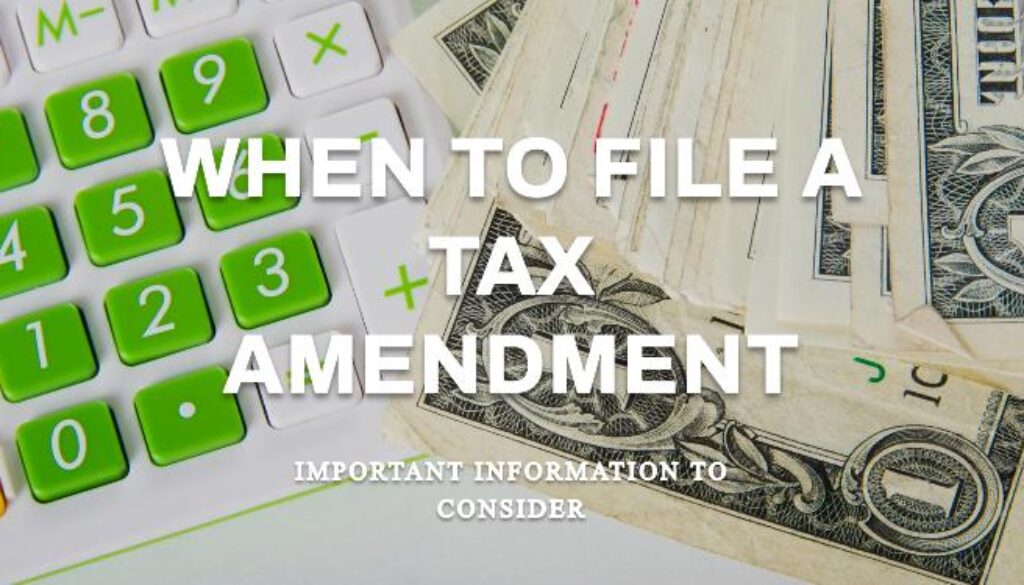4 Essential Tips: Should You File a Tax Amendment After Your Refund?
“4 Essential Tips: Should You File a Tax Amendment After Your Refund?”
Introduction Discover the ins and outs of filing a tax amendment, even after receiving your refund.
Overview
Ever filed your taxes, gotten your refund, and then discovered a mistake? It happens to the best of us! But should you amend your tax return even if you already received a refund? Let’s break down what a tax amendment is and when it might be necessary, even after the IRS sends you a refund.
Amending your tax return following a refund receipt can seem challenging.However, it’s essential to correct any errors or omissions on your tax return to avoid potential penalties from the IRS. This article will guide you through the process and provide tips to make it less intimidating.
What is a Tax Amendment (Form 1040-X)?
A tax amendment, also known as Form 1040-X, is essentially a do-over for your tax return. It allows you to correct errors or omissions from your original filing. This could include claiming missed deductions or credits, reporting additional income, or changing your filing status.
- Product on sale
 Tax Preparation Service$70.00 – $100.00
Tax Preparation Service$70.00 – $100.00
Understand When to File a Tax Amendment
You should file an amendment if there’s a change in your filing status, income, deductions, or credits. If you’ve made a math error or omitted a schedule, the IRS will usually correct it for you.
Know How to File an Amendment
Use Form 1040-X, Amended U.S. Individual Income Tax Return, to correct a previously filed Form 1040-series return. You can request a refund by direct deposit for tax years 2021 and later.
Need help filing your taxes?
Click here to Book an online appointment
Check the Status of Your Amendment
You can check the status of your Form 1040-X using the “Where’s My Amended Return?” online tool or by calling the IRS three weeks after filing.
Consult a Tax Professional
If you’re unsure about your specific situation, it’s always a good idea to consult with a tax professional. They can provide guidance and help you navigate the amendment process.
FAQs
- Can I file a tax amendment after receiving my refund? Yes, you can. In fact, the IRS recommends waiting until you’ve received your refund before filing an amendment.
- What happens if I owe money after amending my return? If you owe money after amending, you’ll need to include payment with your amendment form.
- Can the IRS ask for some of the refund back? Yes, the IRS can ask for some of the refund back if they find errors or discrepancies on your return.
- How can I get a tax transcript online? You can get a tax transcript online from the IRS by visiting their Get Transcript page and following the prompts.
- Should I wait for the IRS to contact me about a mistake on my return? It’s generally better to file an amendment as soon as you discover the mistake. However, if you e-filed your original return, give it time to be processed before you amend.
Conclusion Amending your tax return following the receipt of your refund is not as intimidating as it may appear. By understanding when and how to file an amendment, checking its status, and consulting a tax professional, you can navigate the process with ease. Remember, it’s always better to correct any errors as soon as possible to avoid potential penalties. So, don’t wait, amend today!
Ready to file your tax amendment? Don’t wait any longer! Contact us or visit the IRS website to get started. Your future self will thank you.
For more information on filing amended tax returns, visit the IRS website: https://www.irs.gov/filing/file-an-amended-return
My Business Web Space may earn an Affiliate Commission if you purchase something through recommended links in this article.
Discover more from My Business Web Space
Subscribe to get the latest posts sent to your email.
